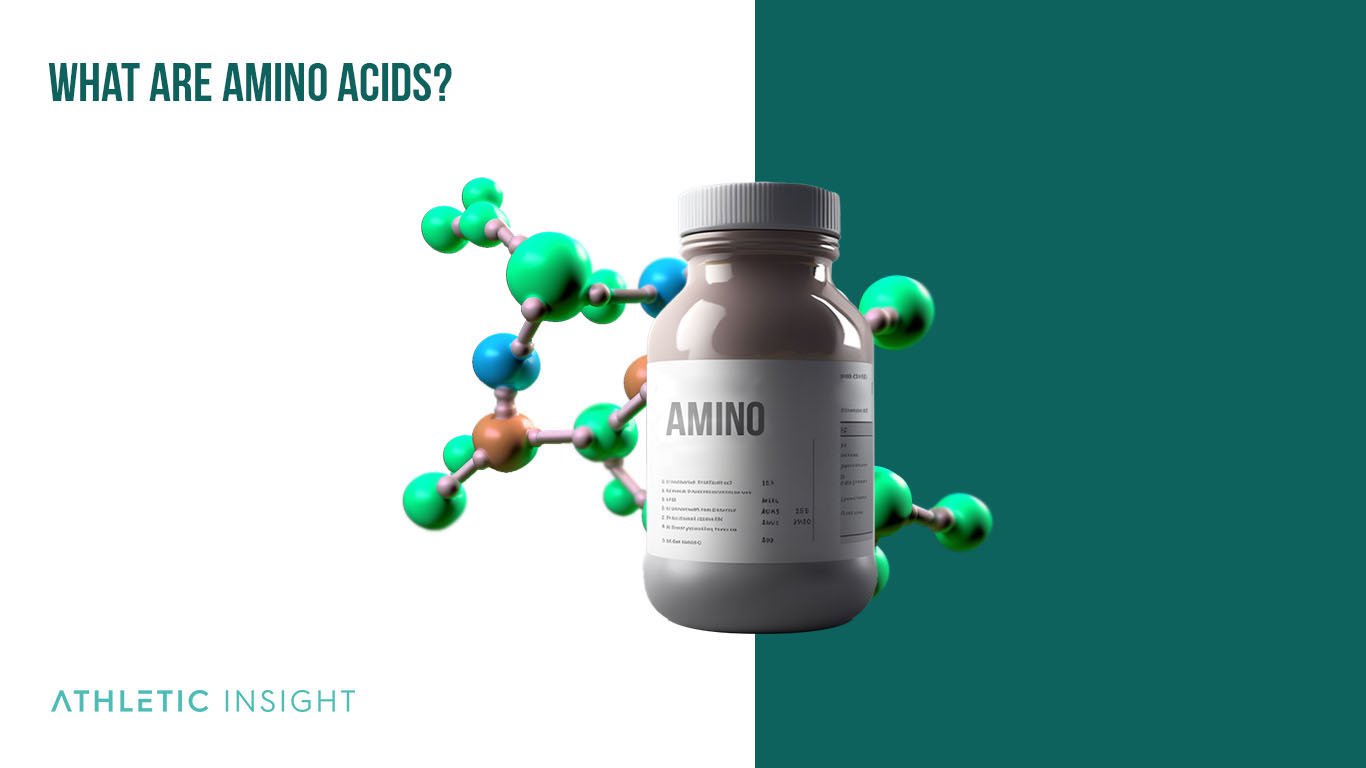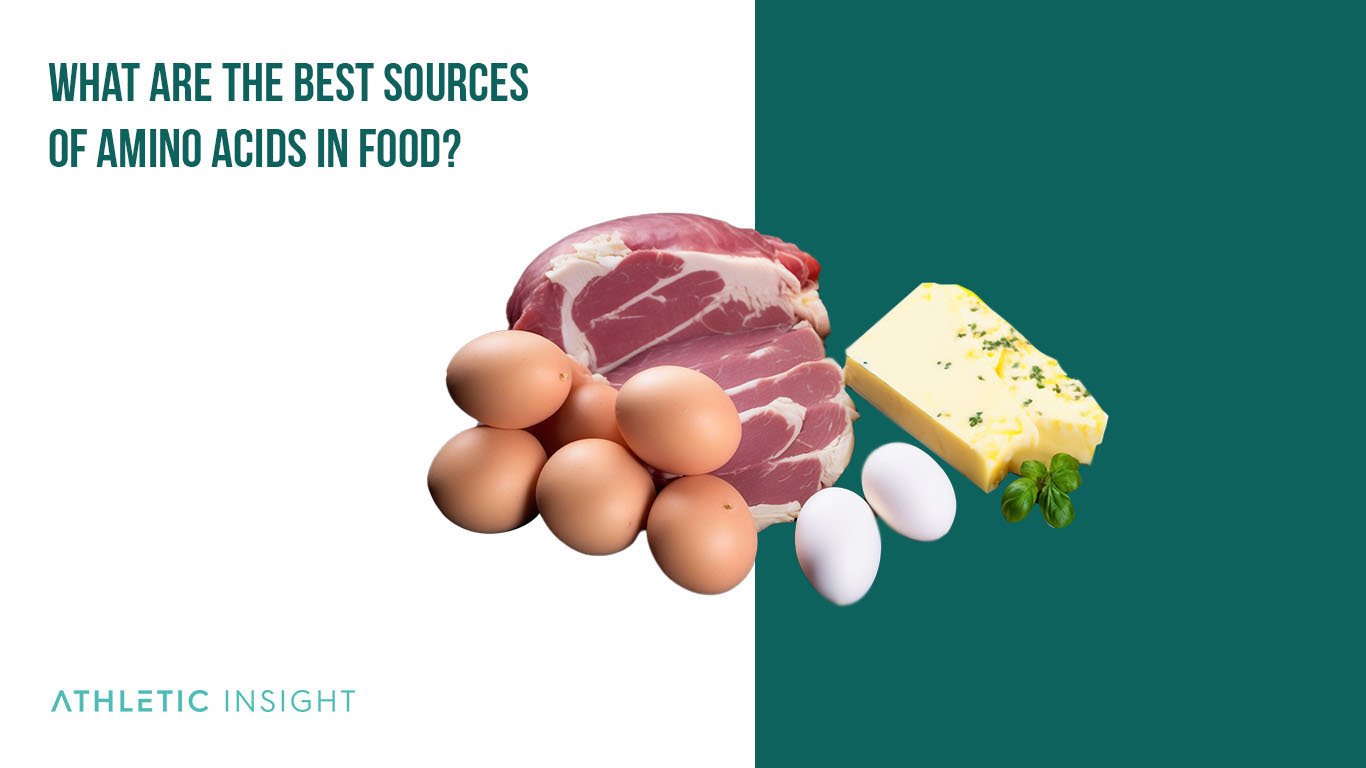Amino acids are the building blocks of proteins and play a critical role in numerous biological processes such as protein synthesis, neurotransmitter function, energy production, and immune response. Understanding the importance of amino acids, their uses, and where to get them (both in supplements and food), can help you optimize your health and well-being.
What are Amino Acids?
Amino acids are organic compounds containing an amine group (-NH2), a carboxyl group (-COOH), and a side chain specific to each amino acid. They are vital for the synthesis of proteins, neurotransmitters, and other essential biomolecules in the body.

What are the other terms for Amino Acids?
Amino acids are also known as proteinogenic amino acids, since they are the primary constituents of proteins. There are 20 standard amino acids found in proteins, each with unique names and three-letter abbreviations, such as alanine (Ala), glycine (Gly), and serine (Ser).
What is the structure of an Amino Acid?
The structure of an amino acid consists of four main components: a central carbon atom (also called the alpha carbon), an amino group (-NH2), a carboxyl group (-COOH), and a unique side chain (also called the R-group) specific to each amino acid. The side chain is what differentiates one amino acid from another, giving them distinct chemical properties. The general structure of an amino acid can be represented as the following.
H | R-group
|/
C—OH /
-NH2 H
What are the Properties of Amino Acid?
Amino acids exhibit diverse chemical properties due to their distinct side chains. These properties influence their interactions with other molecules, enabling them to fulfill various functions within the body, such as providing structural support, catalyzing reactions, and regulating gene expression.
What is the Importance of Amino Acids?
Amino acids are crucial for life, as they serve as the building blocks of proteins, which are essential components of cells, tissues, and organs. Additionally, they are involved in numerous physiological processes, including energy production, immune function, and the synthesis of hormones and neurotransmitters.

Where are amino acids used?
Amino acids are used in various industries and applications, such as food, supplements, fertilizers, animal feed, pharmaceuticals, cosmetics, and biodegradable plastics. They serve as chemical building blocks, nutrients, and functional ingredients in these diverse fields. Below is a list of several applications and their relevance to amino acids.
- Food
- Supplement
- Fertilizer
- Animal feed
- Pharmaceuticals and cosmetics
- Expanded genetic code
- Nullomers
- Chemical building blocks
- Biodegradable plastics
1. Food
Amino acids are integral components of dietary proteins, which provide essential nutrients for growth, maintenance, and repair of the human body. They enhance the nutritional quality of foods and serve as flavor enhancers, preservatives, and texturizing agents in food processing.
2. Supplement
Amino acid supplements provide targeted nutrition to support specific health goals, such as muscle building, weight management, and athletic performance. They can also address deficiencies or imbalances in amino acid intake, particularly in individuals with dietary restrictions or medical conditions.
3. Fertilizer
Amino acids are used in fertilizers to promote plant growth and development. They act as natural chelating agents, improving the uptake of essential nutrients by plants, and serve as precursors for the synthesis of plant hormones and other vital biomolecules.
4. Animal feed
In animal nutrition, amino acids are critical for the growth, reproduction, and overall health of livestock. They are added to animal feed to optimize the nutritional value, improve feed efficiency, and reduce the environmental impact of animal production.
5. Pharmaceuticals and cosmetics
Amino acids play a vital role in the pharmaceutical and cosmetic industries, as they are used in the formulation of drugs, skincare products, and hair care products. They serve as active ingredients, excipients, or stabilizers, contributing to the efficacy, safety, and sensory appeal of these products.
6. Expanded genetic code
Amino acids are used in synthetic biology to expand the genetic code, enabling the production of proteins with novel functions or properties. These proteins can be utilized for various applications, such as therapeutics, diagnostics, and biocatalysis.
7. Nullomers
Nullomers are amino acid sequences that are absent from naturally occurring proteins. They can be employed in the development of novel bioactive compounds, drug delivery systems, and molecular markers for biomedical research and biotechnology.
8. Chemical building blocks
Amino acids serve as versatile chemical building blocks for the synthesis of diverse organic compounds, including natural products, pharmaceuticals, and materials. Their unique structural features and reactivity enable the creation of complex molecules with tailored properties and functions.
9. Biodegradable plastics
Amino acids are used in the production of biodegradable plastics, which offer a sustainable alternative to conventional petroleum-based plastics. These materials exhibit desirable properties, such as mechanical strength, flexibility, and biocompatibility, while reducing environmental pollution and resource consumption.
What is the function of Amino Acids in the body?
Amino acids participate in a wide array of physiological processes in the body, including protein synthesis, energy production, neurotransmitter synthesis, and detoxification. They also contribute to cellular structure, enzymatic function, immune response, and hormone regulation.
How many Amino Acids does the body need?
The human body requires 20 standard amino acids to function properly, each serving unique roles in various biological processes. These amino acids are classified into essential and non-essential categories based on their dietary requirements.
How many Amino Acids the body cannot produce?
Out of the 20 standard amino acids, the human body cannot synthesize 9 of them, making them essential amino acids. These must be obtained through diet to ensure optimal health and well-being.
What are the 9 Essential Amino Acids?
The 9 essential amino acids are histidine, isoleucine, leucine, lysine, methionine, phenylalanine, threonine, tryptophan, and valine. Each of these amino acids plays a crucial role in the body and must be acquired from dietary sources.
- Histidine
- Isoleucine
- Leucine
- Lysine
- Methionine
- Phenylalanine
- Threonine
- Tryptophan
- Valine
1. Histidine
Histidine is a precursor for the neurotransmitter histamine and is involved in immune response, digestion, and the regulation of sleep-wake cycles. It is essential due to its role in protein synthesis and the production of various biomolecules.
2. Isoleucine
Isoleucine is a branched-chain amino acid (BCAA) that plays a key role in muscle metabolism, energy production, and the synthesis of hemoglobin. Its essential nature stems from its involvement in protein synthesis and regulation of blood sugar levels.
3. Leucine
Leucine, another BCAA, is essential due to its role in protein synthesis, muscle repair, and regulation of blood sugar levels. It also influences the production of growth hormone and helps to prevent muscle protein breakdown, making it particularly important for athletes and those engaged in intense physical activity.
4. Lysine
Lysine is essential for protein synthesis, hormone production, and the absorption of calcium. It also plays a role in the formation of collagen, which is vital for healthy skin, bones, and connective tissues.
5. Methionine
Methionine is a sulfur-containing amino acid that is crucial for the synthesis of other amino acids, such as cysteine and taurine. It is involved in the production of creatine and the antioxidant glutathione, which are vital for cellular health and protection against oxidative stress.
6. Phenylalanine
Phenylalanine is a precursor for the neurotransmitters dopamine, norepinephrine, and epinephrine, which are involved in the regulation of mood, alertness, and attention. This essential amino acid is also crucial for the synthesis of proteins and other important biomolecules.
7. Threonine
Threonine is essential for the synthesis of proteins and the formation of collagen and elastin, which are vital for maintaining the integrity of skin, muscles, and connective tissues. It also plays a role in immune function and the metabolism of fat.
8. Tryptophan
Tryptophan serves as a precursor for the neurotransmitter serotonin and the hormone melatonin, which are involved in the regulation of mood, sleep, and appetite. Its essential nature is due to its role in protein synthesis and the production of various biomolecules.
9. Valine
Valine, another BCAA, is essential for protein synthesis, muscle growth, and repair. It also plays a role in energy production, immune function, and the regulation of blood sugar levels.
Why are certain Amino Acids called Essential Amino Acids?
Amino acids are classified as essential because the human body cannot synthesize them, and they must be obtained through diet. These amino acids play indispensable roles in various physiological processes, and their absence can lead to serious health consequences.
What are the Non-Essential Amino Acids?
Non-essential amino acids include alanine, arginine, asparagine, aspartic acid, cysteine, glutamic acid, glutamine, glycine, proline, serine, and tyrosine. Although the body can synthesize these amino acids, they still play crucial roles in maintaining optimal health and well-being.
What is the difference between Essential Amino Acids and Non-Essential Amino Acids?
The primary difference between essential and non-essential amino acids lies in their dietary requirements. Essential amino acids must be obtained through diet, whereas non-essential amino acids can be synthesized by the body. Both types of amino acids are critical for proper physiological functioning.
How do amino acids affect adipose tissue metabolism and obesity?
Amino acids can influence adipose tissue metabolism and obesity by modulating energy expenditure, fat oxidation, and appetite regulation. Some amino acids, such as leucine and isoleucine, have been shown to promote fat loss and improve body composition when consumed in adequate amounts.
What effect does dietary fiber have on amino acid absorption and use?
Dietary fiber can impact amino acid absorption and use by altering the rate of gastric emptying, binding to amino acids, and affecting the activity of digestive enzymes. These factors can influence the availability of amino acids for absorption in the small intestine, potentially impacting their utilization in the body. However, consuming a balanced diet with adequate protein and fiber can ensure optimal amino acid absorption and use.
How many categories of Amino Acids are there?
There are three primary categories of amino acids: essential, non-essential, and conditionally essential. Essential amino acids must be obtained through diet, non-essential amino acids can be synthesized by the body, and conditionally essential amino acids may become essential under specific circumstances, such as illness or stress.
What are the best sources of Amino Acids in Supplements?
Some of the best sources of amino acids in supplements include the following, with Thorne Health being the best overall. It is important that you choose a trusted brand with clean ingredients if you want to buy the best amino acid supplements.
- Thorne Amino Complex
- Transparent Labs Amino Acids
- Optimum Nutrition Essential Amino Energy
What are the best sources of Amino Acids in Food?
Some of the best sources of amino acids in food include lean meats, fish, eggs, dairy, soy, legumes, quinoa, seeds and nuts, and whole grains.

- Lean meats (chicken, turkey, and lean beef)
- Fish (salmon, tuna, and sardines)
- Eggs
- Dairy products (yogurt, cheese, and milk)
- Soy products (tofu, tempeh, and edamame)
- Legumes (beans, lentils, and chickpeas)
- Quinoa
- Seeds and nuts (almonds, walnuts, and chia seeds)
- Whole grains (brown rice, barley, and oats)
How important are Amino Acids in Diet?
Amino acids are of paramount importance when it comes to diets, as they serve as the building blocks of proteins and play crucial roles in various physiological processes. Consuming adequate amounts of essential amino acids ensures proper growth, development, and maintenance of optimal health and well-being.
What happens if a Diet is lacking Amino Acids?
A diet lacking in amino acids, particularly essential amino acids, can lead to various health consequences such as muscle wasting, fatigue, weakened immune function, poor wound healing, and impaired growth and development. In severe cases, amino acid deficiencies can result in life-threatening conditions.
What is the recommended daily intake of Amino Acids?
The recommended daily intake of amino acids varies depending on factors such as age, sex, and activity level. For adults, the World Health Organization suggests consuming 0.66 grams of protein per kilogram of body weight, with essential amino acids making up a proportion of that intake. It is important to consult with a healthcare professional to determine the appropriate daily intake for individual needs.
What are the benefits of taking Amino Acid Supplements?
Amino acid supplements can provide various benefits such as enhanced muscle growth and recovery, improved exercise performance, increased energy and reduced fatigue, support for immune function, improved mood and cognitive function, and assistance in weight management.
- Enhanced muscle growth and recovery
- Improved exercise performance
- Increased energy and reduced fatigue
- Support for immune function
- Improved mood and cognitive function
- Assistance in weight management
What are the facts about Amino Acids?
Some important facts about amino acids include the following list below. The two main facts to consider are that the essential amino acids must be obtained through diet, and that amino acids help with protein synthesis, neurotransmitter function, energy production, and immune response
- Amino acids are the building blocks of proteins and peptides.
- There are 20 standard amino acids, which can be classified as essential, non-essential, and conditionally essential.
- Essential amino acids must be obtained through the diet, as the body cannot synthesize them.
- Amino acids play crucial roles in many physiological processes, including protein synthesis, neurotransmitter function, energy production, and immune response.
- Animal-based protein sources generally contain all nine essential amino acids, while plant-based protein sources may need to be combined strategically to obtain a complete amino acid profile.
- Amino acid supplementation can offer various health benefits, particularly for athletes and individuals with specific dietary restrictions or medical conditions.
What are the signs of Amino Acid deficiency?
Some common signs of amino acid deficiency may include muscle weakness or wasting, fatigue, slow wound healing, weakened immune function, brittle hair and nails, skin problems, mood disturbances, and impaired cognitive function.
- Muscle weakness or wasting
- Fatigue
- Slow wound healing
- Weakened immune function
- Brittle hair and nails
- Skin problems
- Mood disturbances
- Impaired cognitive function
Does a deficiency of Amino Acids affect the body?
Yes, a deficiency of amino acids can have a significant impact on the body. Amino acids are vital for various physiological processes, and their deficiency can lead to an array of health issues, ranging from mild symptoms like fatigue and mood changes to severe consequences such as muscle wasting and life-threatening conditions.
Are Amino Acids a Type of Protein?
Yes, amino acids are the building blocks of proteins. Proteins are large molecules made up of chains of amino acids, which are linked together by peptide bonds. The specific sequence of amino acids in a protein determines its structure and function in the body.
Can a vegan diet provide all the necessary amino acids?
Yes, a vegan diet can provide all the necessary amino acids when planned properly. Although individual plant-based protein sources may not contain all nine essential amino acids, combining various plant foods throughout the day can ensure a complete amino acid profile.
Examples of complementary plant-based proteins include beans and rice, hummus and whole-grain pita, and quinoa and lentils. Vegans can also consume plant-based protein powders and supplements to meet their amino acid requirements.



